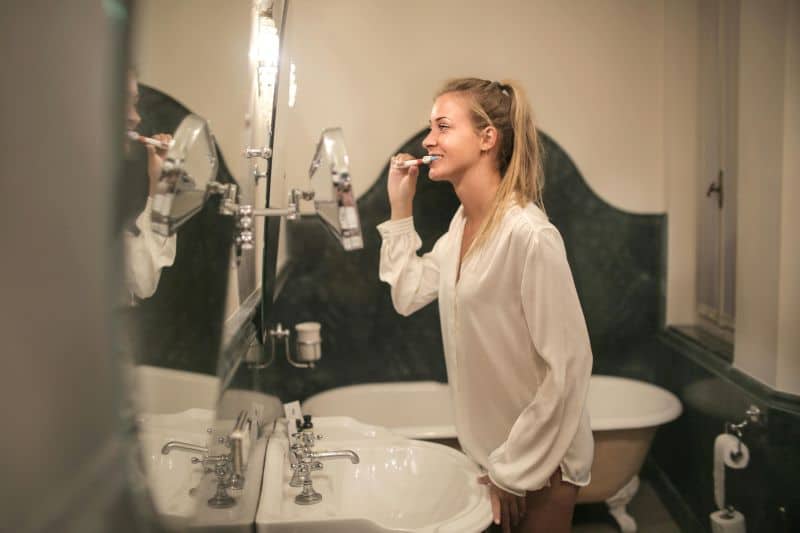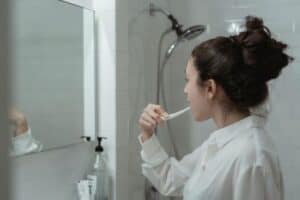
24 Jun Why Skipping Your Nighttime Brush Is Bad News for Your Teeth
Why Skipping Your Nighttime Brush Is Bad News for Your Teeth – Shocking Truths + 7 Reasons
You might think it’s no big deal to skip brushing your teeth before bed every now and then. After all, you’ll just brush in the morning, right? Unfortunately, that’s not how your mouth works. Skipping your nighttime brush can lead to a cascade of dental issues — from plaque buildup to long-term health consequences. In this article, we uncover the powerful reasons why brushing at night is absolutely essential for maintaining healthy teeth and gums.
What Happens in Your Mouth While You Sleep
When you sleep, your body rests, but your mouth becomes a playground for bacteria.
Reduced Saliva Flow at Night
At night, saliva production slows down. Saliva is your mouth’s natural defense against bacteria and acid. During the day, it helps rinse away food particles and neutralize acids. But at night, that protective barrier weakens, giving bacteria free rein to do damage.
Bacteria Growth and Acid Production
Without your toothbrush standing guard, bacteria feast on food particles left behind — especially sugars — producing acids that attack tooth enamel. This acid activity is what leads to decay, cavities, and gum disease.

The Importance of a Nighttime Oral Care Routine
Developing a strong nighttime oral care routine is critical for long-term dental health.
Daily Plaque Removal
Plaque is a sticky film of bacteria that constantly forms on your teeth. If not removed, it hardens into tartar and causes inflammation and decay. Brushing at night ensures you remove a full day’s accumulation of plaque.
Protection Against Gum Disease
Neglecting nighttime brushing allows bacteria to irritate your gums overnight. This can lead to gingivitis, the first stage of gum disease. If untreated, it can progress to periodontitis, a serious condition that damages your jawbone and leads to tooth loss.
7 Alarming Reasons to Never Skip Night Brushing
Brushing your teeth before bed isn’t just a recommendation — it’s a necessity. Here are seven shocking consequences of skipping this vital step.
1. Plaque Builds Up Overnight
When plaque sits undisturbed for hours, it begins to harden. Brushing in the morning won’t remove it all, and over time, this leads to hardened tartar that requires professional cleaning.
2. Increased Risk of Cavities
Nighttime brushing helps remove sugars and acids left from food and drinks. Without this step, enamel is attacked for hours, leading to cavities that may go unnoticed until they’re serious.
3. Higher Chance of Gum Disease
Inflamed gums are often the result of plaque buildup under the gumline. Overnight, bacteria can grow aggressively, increasing your risk of swollen, bleeding gums.
4. Bad Morning Breath Intensifies
Morning breath is often worse when you skip brushing at night. The bacteria responsible for bad breath multiply freely overnight when not kept in check by brushing.
5. Tooth Enamel Deterioration
Repeated acid attacks from uncleaned food residue slowly weaken your enamel, making teeth more sensitive and prone to decay.
6. Long-Term Dental Costs Rise
Neglect today can cost you tomorrow. Cavities, root canals, and periodontal treatments are expensive and avoidable with proper care.
7. Overall Health Impacts
Poor oral health has been linked to heart disease, diabetes, and respiratory infections. Skipping nighttime brushing contributes to chronic inflammation that affects your whole body.
Scientific Evidence Linking Nighttime Brushing and Oral Health
Multiple studies have confirmed that brushing before bed significantly reduces plaque, gingivitis, and cavity risks. According to the American Dental Association, nighttime brushing is one of the most crucial steps in preventing oral disease. Here’s a study overview that explains the correlation between oral hygiene and systemic health.

How to Create an Effective Nighttime Brushing Routine
Creating a nightly routine doesn’t have to be complicated. A few consistent steps make a world of difference.
Timing and Technique
Brush your teeth for two full minutes using a soft-bristled brush. Use gentle circular motions and make sure to reach the gumline.
Choosing the Right Toothpaste
Opt for fluoride toothpaste to help strengthen enamel and fight off cavities. Sensitive teeth? Choose a formula designed for enamel protection.
Incorporating Flossing and Mouthwash
Flossing removes debris your toothbrush can’t reach. An antimicrobial mouthwash helps reduce bacteria and freshen breath while you sleep.
Common Myths About Nighttime Brushing
Let’s bust a few common misconceptions that might be keeping you from prioritizing your nightly oral care.
Myth: Brushing Once a Day is Enough
Brushing once a day doesn’t remove a full day’s buildup of plaque and bacteria. Twice daily brushing — morning and night — is the standard for a reason.
Myth: Eating After Brushing Negates the Benefits
If you eat after brushing at night, you should brush again. But this doesn’t mean brushing before bed is pointless. In fact, it’s better to brush and re-brush than not at all.
Dentist Recommendations and Best Practices
Dentists agree: brushing before bed is a non-negotiable part of oral hygiene. They also recommend:
-
Replacing your toothbrush every 3-4 months.
-
Using fluoride toothpaste.
-
Avoiding sugary snacks before bedtime.
-
Flossing at least once a day, preferably at night.

FAQs
What type of toothbrush is best for nighttime brushing?
A soft-bristled toothbrush is ideal because it cleans effectively without damaging your gums or enamel. Electric toothbrushes can also enhance plaque removal.
How long should I wait after eating before brushing my teeth at night?
It’s best to wait 30 minutes after eating, especially if you had something acidic (like citrus or soda). Brushing too soon can wear down softened enamel.
Do I need to brush after drinking alcohol at night?
Yes. Alcohol dries out your mouth, reducing saliva production and increasing bacterial activity. Brushing helps counteract this effect.
Can I brush my teeth right before going to sleep, or should I do it earlier?
You should brush after your last food or drink (except water). The closer to bedtime, the better — so bacteria don’t have time to multiply before you sleep.
Is brushing without toothpaste better than not brushing at all?
Yes. While fluoride toothpaste is ideal, brushing without it is still better than skipping entirely. It helps remove food and plaque from your teeth.
How often should I replace my toothbrush or brush head?
Every 3–4 months, or sooner if the bristles are frayed. A worn-out toothbrush is less effective at removing plaque and bacteria.
Does brushing at night help with teeth whitening?
Yes. Removing stains and plaque at night helps prevent discoloration. Brushing also supports the effectiveness of whitening products if you use them.
Can skipping brushing at night affect my gums even if my teeth feel clean?
Absolutely. Gum disease often starts silently. Even if your teeth feel clean, bacteria can build up along and under the gumline, leading to inflammation.
Is flossing more important at night or in the morning?
Flossing is especially important at night because it removes food and plaque that could sit between your teeth for hours while you sleep.
Do I need to brush my tongue at night too?
Yes. Bacteria on your tongue contribute to bad breath and plaque. A quick tongue brush helps freshen your breath and reduce harmful microbes.
What’s better before bed — mouthwash or brushing?
Brushing is essential; mouthwash is a good optional add-on. Mouthwash alone won’t remove plaque, but it can help reduce bacteria and improve breath.
Can I just chew gum or use a mint if I can’t brush?
Chewing sugar-free gum is better than nothing — it stimulates saliva. But it’s no substitute for brushing and flossing. It’s a temporary solution, not a fix.
Are water flossers effective at night?
Yes. Water flossers can be very effective, especially for people with braces or gum issues. Use them in addition to brushing for a thorough clean.
Conclusion
Skipping your nighttime brush may seem harmless, but the science says otherwise. From cavities to gum disease and even heart issues, the effects can be serious — and avoidable. Prioritize your oral health by making nighttime brushing a non-negotiable part of your routine. Your smile (and your wallet) will thank you.


Sorry, the comment form is closed at this time.